Spy fiction is a genre of literature involving espionage as an important context or plot device. It emerged in the early twentieth century, inspired by rivalries and intrigues between the major powers, and the establishment of modern intelligence agencies. It was given new impetus by the development of fascism and communism in the lead-up to World War II, continued to develop during the Cold War, and received a fresh impetus from the emergence of rogue states, international criminal organizations, global terrorist networks, maritime piracy and technological sabotage and espionage as potent threats to Western societies. As a genre, spy fiction is thematically related to the novel of adventure, the thriller and the politico-military thriller.

Cold War espionage describes the intelligence gathering activities during the Cold War between the Western allies and the Eastern Bloc. Both relied on a wide variety of military and civilian agencies in this pursuit.

The Man Who Never Was is a 1956 British espionage thriller film produced by André Hakim and directed by Ronald Neame. It stars Clifton Webb and Gloria Grahame and features Robert Flemyng, Josephine Griffin and Stephen Boyd. It is based on the book of the same name by Lt. Cmdr. Ewen Montagu and chronicles Operation Mincemeat, a 1943 British intelligence plan to deceive the Axis powers into thinking the Allied invasion of Sicily would take place elsewhere in the Mediterranean.

Contraband (1940) is a wartime spy film by the British director-writer team of Michael Powell and Emeric Pressburger, which reunited stars Conrad Veidt and Valerie Hobson after their earlier appearance in The Spy in Black the previous year. On this occasion, Veidt plays a hero, something he did not do very often, and there is also an early (uncredited) performance by Leo Genn.

King Kong Escapes is a 1967 kaiju film directed by Ishirō Honda, with special effects by Eiji Tsuburaya. The film was a Japanese–American co-production between Toho and Rankin/Bass, and stars Rhodes Reason, Linda Miller, Akira Takarada, Mie Hama, Eisei Amamoto, with Haruo Nakajima as King Kong and Hiroshi Sekita as Mechani-Kong and Gorosaurus. The film is loosely based on Rankin/Bass' series The King Kong Show, and was the second and final Toho-produced film featuring King Kong, until its 2021 collaboration with Warner Bros on Godzilla vs. Kong. King Kong Escapes was released in Japan on July 22, 1967, and released in the United States on June 19, 1968. It is the fourth entry in the King Kong franchise.

Patrick David Barr was an English actor. In his career spanning over half a century, he appeared in about 144 films and television series.

John Ridgely was an American film character actor with over 175 film credits.

John Beach Litel was an American film and television actor.
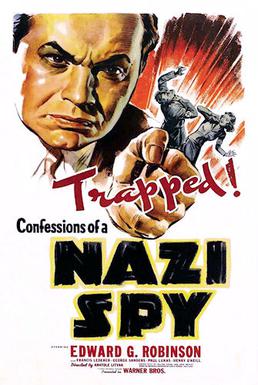
Confessions of a Nazi Spy is a 1939 American spy political thriller film directed by Anatole Litvak for Warner Bros. It was the first explicitly anti-Nazi film to be produced by a major Hollywood studio, being released in May 1939, four months before the beginning of World War II and two and a half years before the United States' entry into the war.
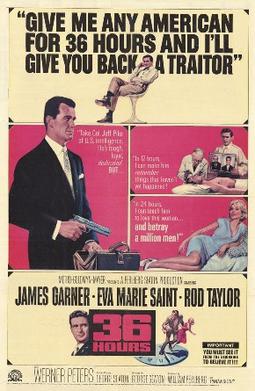
36 Hours is a 1964 American war thriller film written and directed by George Seaton from a story by Carl K. Hittleman and Luis Vance, based on the 1944 short story "Beware of the Dog" by Roald Dahl. The film stars James Garner, Eva Marie Saint, Rod Taylor, and Werner Peters. In the plot, a Nazi German army doctor tries to obtain vital information from an American military intelligence officer by convincing him that it is 1950 and World War II is long over.
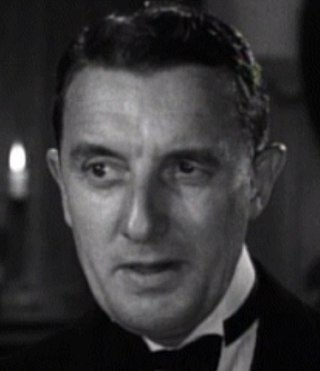
Henry Victor was an English-born character actor who had his highest profile in the film silent era, he appeared in numerous film roles in his native Britain, before emigrating to the United States in 1939 where he continued his career, working in Hollywood films

Marie-Madeleine Fourcade was the leader of the French Resistance network "Alliance", under the code name "Hérisson" ("Hedgehog") after the arrest of its former leader, Georges Loustaunau-Lacau (“Navarre”), during the German military administration in occupied France during World War II.
Hans Heinrich von Twardowski was a German film actor.

The Duquesne Spy Ring is the largest espionage case in the United States history that ended in convictions. A total of 33 members of a Nazi German espionage network, headed by Frederick "Fritz" Duquesne, were convicted after a lengthy investigation by the Federal Bureau of Investigation (FBI). Of those indicted, 19 pleaded guilty. The remaining 14 were brought to jury trial in Federal District Court, Brooklyn, New York, on September 3, 1941; all were found guilty on December 13, 1941. On January 2, 1942, the group members were sentenced to serve a total of over 300 years in prison.
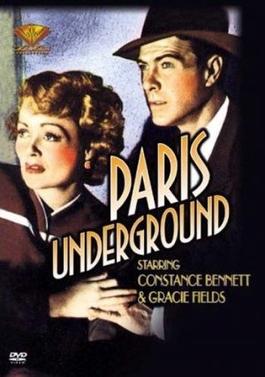
Paris Underground, also known as Madame Pimpernel, is a 1945 film directed by Gregory Ratoff, and based on the memoir of the same title by Etta Shiber.

Hotel Reserve is a 1944 British spy film starring James Mason as an innocent man caught up in pre-Second World War espionage. Other cast members include Lucie Mannheim, Raymond Lovell and Herbert Lom. It was based on Eric Ambler's 1938 novel Epitaph for a Spy. Unusually, it was both directed and produced by a trio: Lance Comfort, Mutz Greenbaum and Victor Hanbury. It was shot at Denham Studios with sets designed by the art director William C. Andrews. The film was produced and distributed by the British branch of RKO Pictures.

Diplomatic Courier is a 1952 American spy film noir directed by Henry Hathaway and starring Tyrone Power, Patricia Neal and Stephen McNally. The nightclub scene in the film features actor Arthur Blake, famous for his female impersonations, impersonating Carmen Miranda, Bette Davis, and Franklin D. Roosevelt. The plot was loosely adapted from the 1945 novel Sinister Errand by British writer Peter Cheyney.
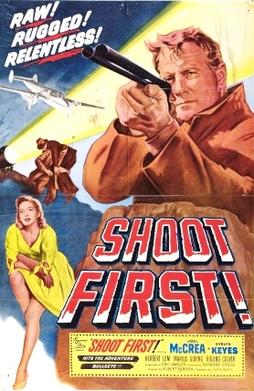
Rough Shoot, released in the USA as Shoot First, is a 1953 British thriller film directed by Robert Parrish and written by Eric Ambler, based on the 1951 novel by Geoffrey Household. The film stars Joel McCrea, in his only postwar non-Western role, with Evelyn Keyes as the leading lady, and featuring Herbert Lom, Marius Goring and Roland Culver. The scenario is set in Cold War England when tensions ran high regarding spying.
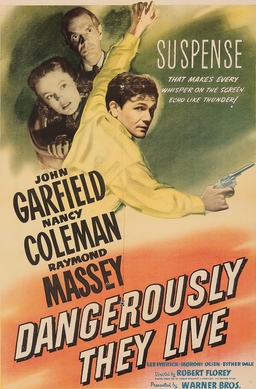
Dangerously They Live is a 1941 American World War II spy thriller film directed by Robert Florey and starring John Garfield, Nancy Coleman and Raymond Massey. The plot concerns Nazi spies who try to pry information out of a British agent.

Secret Enemies is a 1942 American drama film directed by Benjamin Stoloff and written by Raymond L. Schrock. The film stars Craig Stevens, Faye Emerson, John Ridgely, Charles Lang, Robert Warwick, and Frank Reicher. The film was released by Warner Bros. on September 17, 1942.


















